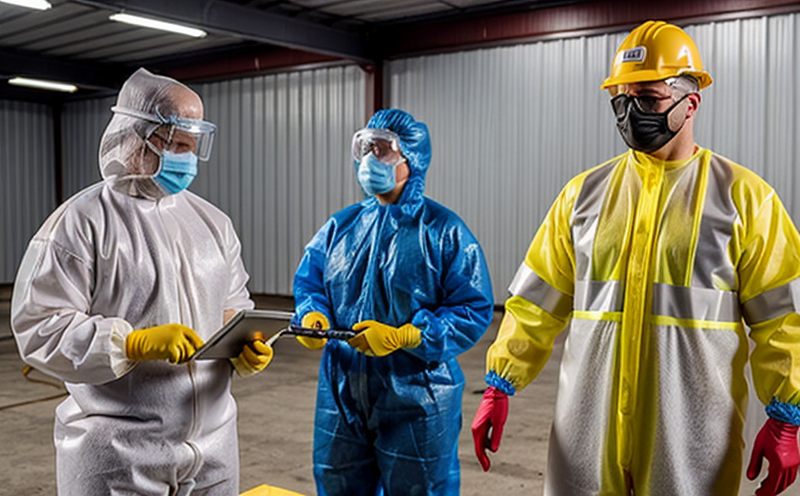BS EN 374-4 Protective Gloves Degradation Testing
The BS EN 374-4 standard specifies the methods and requirements for determining the resistance of gloves to chemical degradation. This testing is critical in ensuring that personal protective equipment (PPE) meets stringent safety standards, protecting workers from hazardous chemicals in various industries such as manufacturing, healthcare, and construction.
Protective gloves are often subjected to harsh environmental conditions, including exposure to corrosive materials like acids, alkalis, solvents, and other chemical agents. The BS EN 374-4 standard provides a standardized approach to evaluate the integrity of these gloves under such conditions. By following this protocol, laboratories can ensure that the gloves maintain their protective properties over time.
The testing process involves exposing samples of gloves to specific chemicals according to predefined test methods outlined in the standard. After exposure, the samples are visually inspected for any signs of degradation such as discoloration, cracking, or loss of mechanical integrity. Additionally, physical tests may be conducted to assess changes in material properties like tensile strength and elongation at break.
The BS EN 374-4 standard is widely recognized across Europe and beyond due to its robust framework for evaluating chemical resistance. Compliance with this standard is mandatory in many jurisdictions where workers are exposed to hazardous chemicals, ensuring that the gloves used meet stringent safety requirements. Laboratories accredited under this standard can provide reliable test results, enhancing trust among clients and stakeholders.
In summary, BS EN 374-4 testing plays a crucial role in maintaining worker safety by ensuring that protective gloves remain effective against chemical hazards. This process involves rigorous exposure to chemicals followed by meticulous inspection and evaluation of the gloves' performance. Accurate compliance with this standard is vital for industries where occupational health and safety are paramount.
Industry Applications
The BS EN 374-4 standard finds application in various sectors, particularly those involving direct handling or exposure to hazardous chemicals. Key areas include:
- Manufacturing Industries: Processes that involve contact with solvents, acids, and other corrosive materials.
- Healthcare Facilities: Handling of chemicals in laboratories or during sterilization processes.
- Construction Sites: Exposure to concrete mixtures, paints, and other chemical compounds used in construction.
- Chemical Plants: Workers involved in the production or handling of hazardous substances.
These industries rely on protective gloves that can withstand prolonged exposure to chemicals without compromising their integrity. The BS EN 374-4 standard ensures that these gloves meet strict chemical resistance requirements, thereby enhancing worker safety and reducing the risk of chemical injuries.
Eurolab Advantages
Accredited laboratories like Eurolab offer several advantages when it comes to BS EN 374-4 testing:
- Comprehensive Testing Capabilities: Eurolab provides a full suite of services for PPE testing, including chemical resistance assessments.
- State-of-the-Art Facilities: Our laboratories are equipped with the latest instrumentation and equipment to ensure accurate and reliable test results.
- Experienced Technicians: Our team of experts has extensive experience in PPE testing, ensuring that each sample is handled with precision and care.
- Strict Compliance to Standards: Eurolab adheres strictly to international standards such as BS EN 374-4, guaranteeing consistent and accurate test outcomes.
- Timely Reporting: Clients receive detailed reports within agreed-upon timelines, facilitating swift decision-making processes.
- Comprehensive Consultation Services: Our experts offer guidance on selecting the appropriate gloves for specific chemical environments and interpreting test results.
- Cost-Effective Solutions: Eurolab provides competitive pricing without compromising on quality, making our services accessible to a wide range of clients.
By leveraging these advantages, Eurolab ensures that its clients receive the highest level of service and expertise in BS EN 374-4 testing.
Use Cases and Application Examples
The following use cases illustrate how BS EN 374-4 testing can be applied in real-world scenarios:
- Manufacturing Plants: Testing gloves used by employees handling solvents and acids during production processes.
- Pharmaceutical Facilities: Evaluating the chemical resistance of gloves in laboratories where researchers handle hazardous chemicals.
- Construction Sites: Assessing the durability and integrity of gloves used by laborers during concrete mixing and painting tasks.
- Biotechnology Companies: Ensuring that workers in biolabs are adequately protected against pathogenic agents using gloves that meet strict chemical resistance standards.
In each of these cases, the BS EN 374-4 standard provides a benchmark for evaluating whether the protective equipment is suitable for its intended use. This ensures that workers can perform their tasks safely and effectively without compromising their health or well-being.





